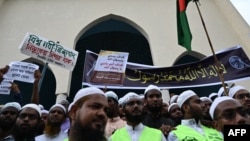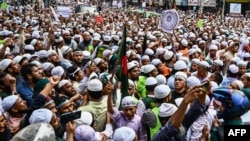Several thousand activists and leaders from Islamist political parties in Bangladesh marched Thursday toward the Indian High Commission in the capital, Dhaka, protesting derogatory remarks about Islam’s prophet made by two prominent figures in India’s ruling Bharatiya Janata Party (BJP).
They gathered under the banner of Islami Andolon Bangladesh (IAB), one of the largest religion-based political platforms of the South Asian nation, and demanded exemplary punishment for BJP leaders Nupur Sharma and Naveen Jindal.
India has been scrambling to contain a diplomatic storm that has erupted in Muslim majority countries following controversial comments made by the two politicians weeks ago.
Bangladesh’s police thwarted the IAB procession before it could reach the Indian High Commission but allowed the march leaders to proceed toward the commission to submit a protest memorandum.
In the memorandum, a copy of which was obtained by VOA, IAB wrote, “Nupur Sharma and Naveen Jindal are a continuation of the anti-Muslim policies of the present ruling BJP and its branches.
Punishment demanded
“Although the ruling party has removed Nupur Sharma and Naveen Jindal from office under domestic and foreign pressure, we demand their arrest and exemplary punishment for this provocative statement,” IAB wrote.
Last week, at least 20,000 people protested outside Dhaka’s main mosque, Baitul Mukarram, after Friday prayers, chanting slogans such as “Boycott Indian products” and “Hang those who insult our prophet.”
Smaller processions were reported from other parts of the country to protest the controversial remarks.
Those protests were jointly organized by a number of Islamist political parties, including IAB, Jamiat Ulema-e-Islam Bangladesh and Islami Oikya Jote, although many unaffiliated people also took part.
The past week has seen other protests, including a human chain formed in the street by high school students.
While both Islamist political parties and common people have been vociferous, the Bangladesh government has remained noticeably silent on the issue, prompting growing criticism aimed at the Sheikh Hasina administration.
Harunur Rashid, a lawmaker from the main opposition Bangladesh Nationalist Party (BNP), urged the parliament to summon India’s high commissioner and bring a motion of condemnation in parliament.
“We all know that the whole world is protesting against the insult to our prophet in India," Rashid said. "It is also happening in Bangladesh. But worryingly, we as a Muslim-majority country and an important member in SAARC [South Asian Association for Regional Cooperation] are noticing with concern that our government is yet to express any protest or give any reaction on this issue.”
Talking with VOA, Dhaka University law professor Asif Nazrul said the government has been silent because it does not want to antagonize India, even if it involves the honor of Islam’s prophet.
“Sheikh Hasina’s government stays in power without the people’s mandate, and a large section of people in Bangladesh believe India has a role behind it. So naturally, the Hasina administration would not do anything that would earn the ire of the Modi government,” he said in reference to Indian Prime Minister Narendra Modi.
History of suppression
Nazrul added that in the past 12 years of Hasina’s administration, protests of any kind have been harshly suppressed. “So the government now knows that even if some Islamist parties or other people come out onto the street with an issue like this, they have the capacity to repress it strongly. So they don’t bother to issue any statement.”
International relations expert Imtiaz Ahmed told VOA that some ministers in the Hasina administration have in fact condemned the offensive remarks in different forums.
While talking with a group of visiting Indian journalists last Monday, Information and Broadcasting Minister Hasan Mahmud lauded the Indian government for taking quick action to discipline the two BJP officials and said, “Any statement against the prophet should be condemned.”
But the minister also said the matter is an “internal issue” for India and it is not “an attention-grabbing matter in Bangladesh, unlike in some other Muslim nations.”
Ahmed noted that Hasina has not commented on the controversy even though leaders from Muslim-majority countries have done so, including Pakistani Prime Minister Shahbaz Sharif.
“This has obviously created some sort of uneasiness in the country,” he said.





